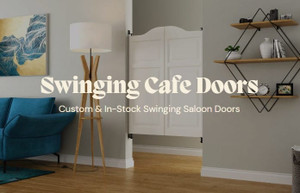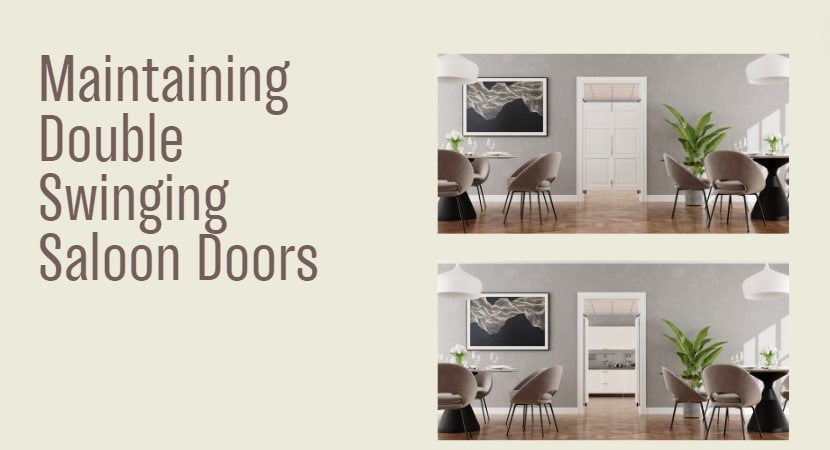
Maintaining Saloon Doors in a Commercial Setting
Maintaining Saloon Doors in a Commercial Setting
 Ever walk into an old Western-themed bar or
restaurant and admire those iconic saloon doors? There's something nostalgic
about their creaky swing and slap. As a business owner, though, you know that
saloon doors require more maintenance than their charming aesthetic lets on. If
you want to keep your saloon doors functioning properly without constant
repairs, you'll need to establish a regular maintenance routine.
Ever walk into an old Western-themed bar or
restaurant and admire those iconic saloon doors? There's something nostalgic
about their creaky swing and slap. As a business owner, though, you know that
saloon doors require more maintenance than their charming aesthetic lets on. If
you want to keep your saloon doors functioning properly without constant
repairs, you'll need to establish a regular maintenance routine.
Neglecting your saloon doors can lead to issues like doors that won't close properly, broken or loose hinges, and wood damage. With some TLC, however, your saloon doors can remain an eye-catching highlight of your business for years to come. In this article, we'll explore best practices for maintaining your commercial saloon doors so you can keep them swinging for customers and avoid unnecessary costs from lack of care. Saddle up, partner-it's time to show your saloon doors some love.
Why Proper Maintenance of Saloon Doors Is Crucial?
Proper maintenance of saloon doors in commercial settings is crucial for both aesthetic and practical reasons. Neglecting routine care and upkeep can lead to damage, decreased functionality, and higher long-term costs.
Regular Inspections
It's a good idea to inspect your saloon doors at least once a month. Check that all hardware like hinges, closers, and push plates are securely installed and functioning properly. Ensure any
Weatherstripping around the edges remains intact. Look for any cracks or holes in the wood or glass panels that could let in drafts or pests. Performing frequent inspections will allow you to catch any issues early before they become bigger problems.
Lubrication
The moving parts of saloon doors like hinges and closers need to be lubricated regularly to prevent squeaking and ensure smooth operation. Apply a few drops of mineral or jojoba oil to all hinges, pivots, slides and closer arms. Wipe away any excess oil with a cloth to avoid drips. Lubricating about once a month or if you notice parts becoming stiff or noisy is a good rule of thumb.
Repairs
As with any fixture in a commercial space, saloon doors will require repairs from time to time. Wooden doors may need sanding, staining or repainting. Loose or damaged hardware should be tightened, repaired or replaced. Cracked or broken glass panels will need to be replaced for safety. It's best to perform any major repairs as soon as issues are noticed to avoid disruption to your business or customers and higher costs down the line.
Performing regular maintenance and timely repairs on your saloon doors will help keep your commercial space looking professional, ensure safe and convenient access, and prevent costly damage. A few minutes of care and upkeep each month can save hours of work and expense in the long run.
How do I keep saloon doors clean and sanitary in a restaurant?
Keeping saloon doors clean in a commercial setting like a restaurant requires diligent maintenance and sanitation practices. As the main entrance to your establishment, saloon doors see a lot of traffic and need to be properly cared for.
To start, wipe down the saloon doors at least once per day with a commercial disinfectant or sanitizer and hot, soapy water. Pay extra attention to high-touch areas like door handles, push plates and any decorative accents. Allow doors to air dry completely to prevent streaks and water damage. For stubborn stains or grime buildup, you may need to scrub more vigorously with an abrasive sponge or scrubber.
In addition to daily cleaning, saloon doors should be deep cleaned at least once a week. To deep clean, remove doors from their hinges and scrub both sides to remove any dirt or debris. Vacuum or sweep the tops and bottoms of doors to pick up dust that can collect there. Re-hanging doors and testing to ensure they are secure and functioning properly.
For saloon doors with windows, glass should be cleaned daily as part of your overall door cleaning routine. Use a commercial glass cleaner or mixture of equal parts white vinegar and water. Squeegee glass to prevent streaks and ensure maximum visibility. Check that any trim or framing around glass panels is also clean and undamaged.
To limit the spread of germs, consider installing automatic door openers, especially in high-volume areas. This allows doors to open without direct contact from customers and staff. You should also place sanitizing wipes or hand sanitizer near saloon doors so people can sanitize their hands after touching the doors.
Keeping your saloon doors well-maintained through regular cleaning, sanitation and repairs will help ensure they continue functioning properly while presenting a clean image to customers and visitors. Consistency is key - establish a regular cleaning schedule and stick to it for the best results.
What Maintenance challenges might arise in a high-traffic dining establishment?
Operating a high-volume dining establishment like a saloon comes with certain maintenance challenges, especially for the saloon doors. Those swinging doors see a lot of traffic and use, so they require frequent attention to keep functioning properly and looking their best.
Weathering and Wear
The constant opening and closing, as well as environmental factors like humidity, can cause saloon doors to warp, crack, and split over time. Inspect doors regularly for any damage or wear and repair or replace as needed. Re-staining or re-painting doors every 6-12 months will also help protect them from weathering and keep them looking uniform.
Hinge Maintenance
The hinges that attach the doors to the doorway are under a great deal of stress. Lubricate hinges monthly with a spray-on lubricant to prevent squeaking and ensure smooth operation. Tighten any loose hinge screws right away to prevent the doors from sagging or becoming misaligned. Damaged or broken hinges should be repaired or replaced immediately by a professional to avoid injury or further damage.
Obstructions and Damage
High-traffic areas mean a higher chance of doors becoming obstructed or damaged by carts, equipment, or rowdy patrons. Inspect saloon doors daily to ensure there are no obstructions blocking them from opening and closing properly. Check for any physical damage like dents, chips, or splinters and sand down or replace damaged areas as needed.
Cleaning
Dirty, grimy saloon doors look unappealing and unprofessional. Wipe down doors daily with a damp cloth to remove spills, splatters, and built-up dirt and debris. For stuck-on messes, use a degreasing dish soap and scrub with an abrasive sponge or scrubber. Sanitize doors weekly with a disinfectant to kill germs. Deep clean doors monthly or quarterly by removing them from the hinges and scrubbing all sides before re-hanging.
Keeping a close eye on your saloon doors and performing regular maintenance and cleaning will help ensure they continue functioning safely for years to come. Preventative care and swift action when needed are key to avoiding costly repairs or replacements down the road.
Are there any specific cleaning agents or techniques to use for saloon doors in commercial kitchens?
Are there any specific cleaning agents or techniques to use for saloon doors in commercial kitchens? To properly clean and maintain saloon doors in a commercial kitchen, there are a few key things to keep in mind:
Use heavy-duty degreasers
The swinging doors in a commercial kitchen see a lot of traffic and grease buildup. Use a strong degreaser, like an industrial-strength dish soap or degreasing detergent, to cut through the grime. Spray it on, let it sit for a few minutes and then scrub with an abrasive sponge or scrubber. Rinse well with hot water. For stuck-on messes, you may need to scrub a few times.
Sanitize frequently
In addition to degreasing, saloon doors should be sanitized frequently to kill bacteria and other microbes. Use a commercial sanitizer or diluted bleach solution (1 part bleach to 100 parts water) and spray or wipe down doors at least once per day, or more often if needed. Sanitizing helps prevent the spread of foodborne illness and keeps your kitchen up to health code.
Deep clean weekly
While daily cleaning and sanitizing are important, saloon doors also need a deep weekly cleaning to remove built-up grease and grime. Use a degreaser to cut through tough messes and scrub doors from top to bottom using an abrasive sponge. Rinse thoroughly with hot water. For stubborn stuck-on debris, you may need to use a plastic scraper.
Inspect and repair as needed
Give your saloon doors a regular inspection to check for any needed repairs or maintenance. Look for loose or damaged hardware like hinges, latches or springs that need tightening or replacement. Check that doors are properly aligned and swinging freely. Repair or replace any damaged panels or frames to prevent injury.
Keeping your saloon doors in good working order will maximize their lifespan. By following these best practices for cleaning, sanitizing and maintaining your commercial saloon doors, you'll keep your kitchen safe, compliant and running efficiently. Consistency is key, so build these techniques into your daily and weekly cleaning schedules.
Conclusion
When you invest in authentic saloon doors for your bar, restaurant or other business, you want to make sure you properly care for them to keep them looking their best for years to come. By following some simple maintenance tips, you can do just that. Wipe them down regularly to remove built-up dust and grime, tighten any loose hardware right away, and lubricate hinges as needed to prevent squeaking.
Avoid harsh chemicals that could damage the wood or finish. And if damage does occur, make repairs promptly to prevent further issues. With some routine TLC, your saloon doors will continue to make a stylish statement and stand the test of time. Keeping the Old West alive never looked so good!
